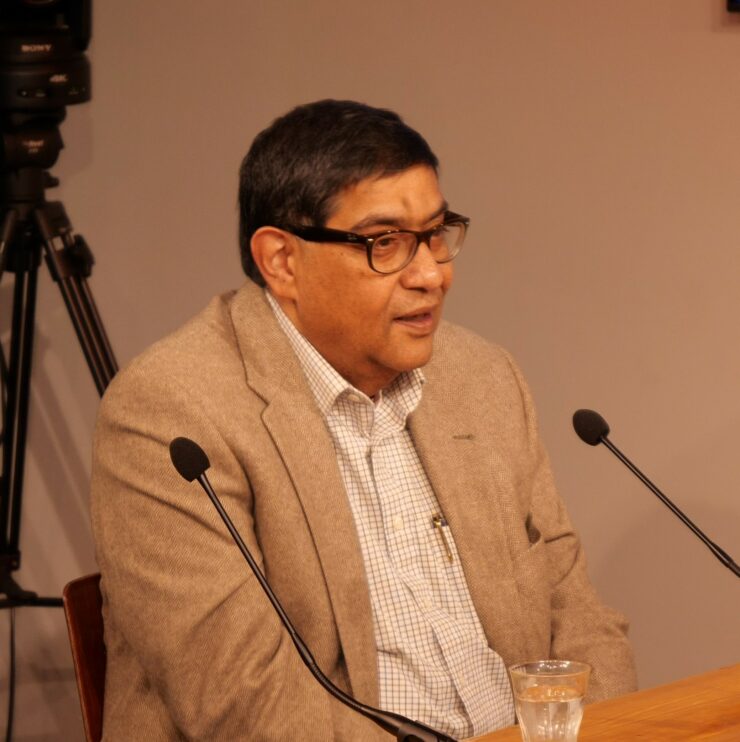News
In hindsight: Former Chairholders on the impact of the tenure on their career and lives. #1: Professor Mansoob Murshed
Professor S. Mansoob Murshed was the first Chairholder from 2002 – 2003. His research focus was in the fields of trade, trade policy political economy and in the field of peace and conflict management in relation to economic development. Mansoob is currently Professor of the Economics of Peace and Conflict at the International Institute of Social Studies (ISS) in the Netherlands and is also Professor of Economics at Coventry University in the UK. His current research interests are in the economics of conflict, resource abundance, aid conditionality, political economy, macroeconomics and international economics.

How it all began
On May 12 2003, Mansoob gave his inaugural address titled The Decline of the Development Contract and the Development of Violent Internal Conflict at Utrecht University. The inaugural address officially established the Prince Claus Chair in Equity and Development. “I think Professor Bastiaan de Gaay Fortman (currently Honorary Professor of Political Economy of Human Rights at the Utrecht School of Law and former Professor at the ISS in Political Economy) and Willem Hendrik Gispen (then Rector Magnificus of Utrecht University) played an instrumental role in my appointment. This Chair also brought a lot of media attention. Not in the least because of (then Princess) Queen Máxima who was very involved with the Chair. I even bought the Telegraaf (a Dutch national newspaper), because it had a picture of me during my acceptance speech which I held in March of 2003, two months prior to the inaugural lecture.”
Exploring the tenure ship
Mansoob was housed at the Economics Department of Utrecht University. “In terms of research, the topics that I was already involved with – economic inequality, civil war, natural resource abundance – continued and where in line with the vision and ambitions of the Chair and Prince Claus himself, so in that way it was a smooth transition.”
As for the interpretation of the tenure, there was a lot of exploration. “I think it’s more organized now and there are more facilities available. I would’ve loved to have a Postdoctoral Researcher, but that was included later. But because we were exploring, it also meant for a more flexible approach. For instance, long after the tenure ended, I gave lectures and talks on the topics of equity and development. I still do to this day. In addition to the lectures I gave in academia, I especially gave a lot of public lectures for a more general audience at for example Studium Generale^. This was probably in part due to the media attention the Chair received at the start and in part due to the fact that the it became known that I gave good speeches. I don’t use notes so my lectures are very interactive. That was one of the greatest benefits for me, to be able to connect with a more general audience, not just with academics.”
“But it also triggered something else”, Mansoob says. “I became more conscious of the policy implications of scientific research as a result of the appointment. And that resulted for example in background papers for the United Nations, the African Development Bank and the World Bank.”
I became more conscious of the policy implications of scientific research.
Emphasize the growth of nationalistic tendencies
“Recently, I’m diversifying to related research topics as well. For instance I recently published an article that builds on the intellectual legacy of famous Dutch economist Jan Tinbergen by extending his analysis on welfare and security into a framework involving strategic interaction and I have another paper that was co-authored with many colleagues on how the COVID-19 pandemic impacted people depending upon their governance.
It’s very important to emphasize the growth of international nationalistic tendencies of governments in our work, but also in our conversations outside of academia.
These are two recent pieces of work, which are I think important because we see the growth of nationalism and illiberal tendencies all over the world. It’s very important to emphasize the growth of international nationalistic tendencies of governments in our work, but also in our conversations outside of academia. That’s my message to the departing and newly installed Chairholders.”
^ Studium Generale is usually a university affiliated public platform for knowledge and reflection.